Perhaps many travelers, who have never been abroad or hold a powerful passport or used to travel to countries they do not need a visa, may not be aware that visa is a must-have item for their every trip abroad.
Vietnam, of course, is not an exception.
Let’s learn full details about Vietnam visa policy with us.
Content:
I. What is Vietnam visa?
Vietnam visa is a certificate issued or a stamp marked (on the applicant’s passport) by the immigration authorities of Vietnam (Vietnam embassy/Consulate or Vietnam Immigration Department) to indicate that the applicant’s credentials have been verified and he/she has been granted permission to enter Vietnam and stay in the country within a specified period. It is also called official permission for Vietnam entry.
Please remember that visa is completely different from Vietnam passport. Vietnam passports are issued to citizens of Vietnam to facilitate their international travel.
II. Forms of Vietnam visa
At the moment, in the visa policy of Vietnam, there are two forms of visa:
- Loose-leaf visa which is often issued to those whose valid passport has no blank page;
- Stamp visa.
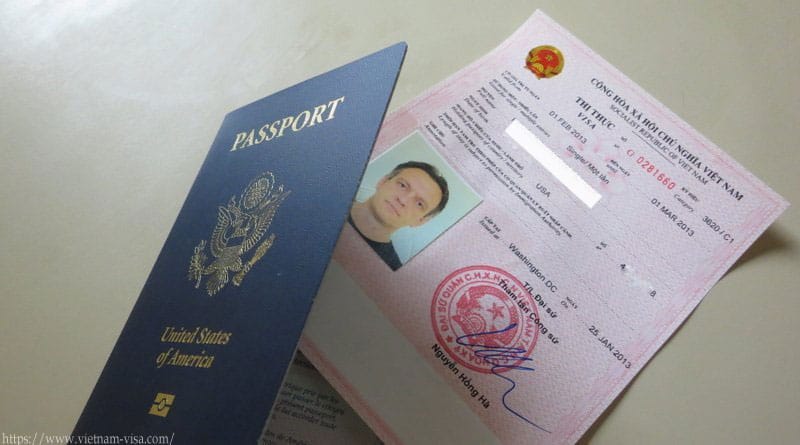
Loose-leaf Vietnam visa
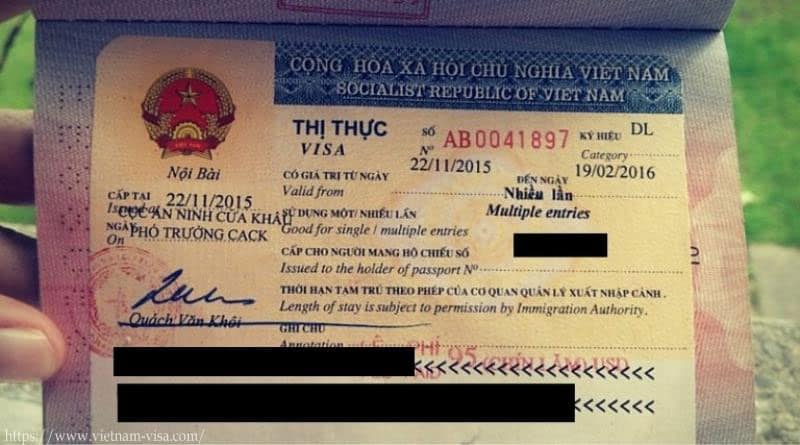
Stamp Vietnam visa
III. Types and Codes of Vietnam visa
Based on the purpose of visiting Vietnam, Vietnam visa is now classified into up to 21 types with corresponding code (under Law No. 51/2019/QH14 amending and supplementing a number of articles of the law on entry, exit, transit and residence of foreigners in Vietnam will take effect on July 1, 2020 – Issued by the National Assembly of Socialist Republic of Vietnam).
► Visit https://www.vietnam-visa.com/vietnam-visa-types/ for full details about Vietnam visa types and codes.
IV. Who do not need a visa for Vietnam entry?
At the moment, not all travelers are required to get a visa for Vietnam. This Vietnam visa exemption policy is detailed below.
Visa exemption policy for holders of popular passports:
- Up to date, holders of popular passports issued by 24 countries do not require visas for Vietnam. However, the exemption is in some cases unconditional but conditional in other cases. And the visa exemption duration varies from 90 days at maximum to 14 days at minimum.
- In addition, a 30-day visa exemption is granted to those entering the coastal economic zones decided by the Government when those zones meet the following conditions:
- having an international airport,
- having their own space;
- having defined geographical boundaries and be separate from the mainland;
- being in line with socio-economic development policies while posing no threat to national defense, security, social order and safety of Vietnam.
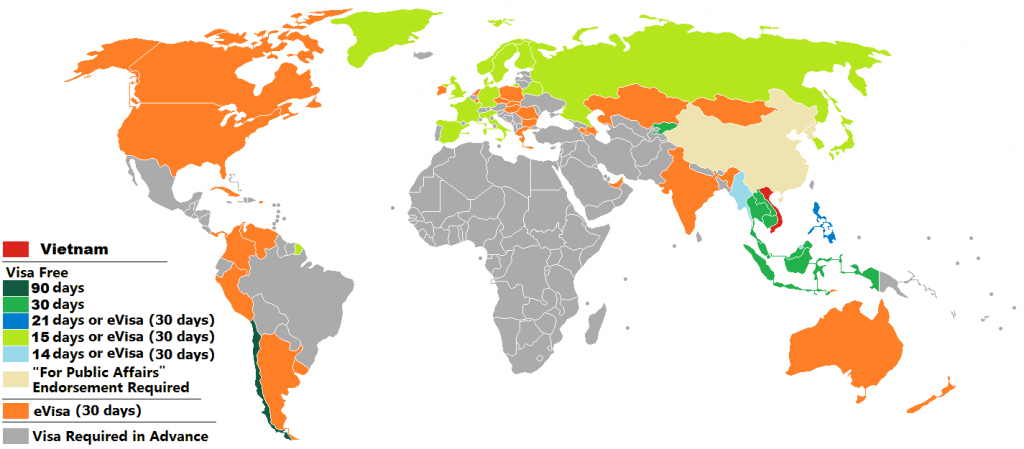
Map of visa exemption policy for popular passport holders (Source: Wikipedia)
Visa exemption policy for overseas Vietnamese national who holds a foreign passport
Holders of Certificates of Visa Exemption do not require a visa regardless of nationality. A Certificate of Visa Exemption is valid for up to 5 years or up to 6 months before the passport expiration date (whichever is shorter). This is available for Vietnamese residing abroad or spouses or children of Vietnamese citizens or Vietnamese residing abroad. The exemption is valid for up to 180 consecutive days of stay and can be extended for a further 180 days. There is no limit placed on the number of entries or exits during the stay or minimum waiting time needed between every 180 days of stay.
Visa exemption policy for holders of a non-popular passport
Holders of diplomatic or service passports of Afghanistan, Albania, Algeria, Angola, Argentina, Armenia, Azerbaijan, Bangladesh, Belarus, Bolivia, Brazil, Bulgaria, Chile, China, Colombia, Costa Rica, Côte d’Ivoire, Croatia, Cuba, Cyprus, Dominican Republic, Ecuador, Egypt, El Salvador, France, Germany, Hungary, India, Iraq, Italy, Japan, Kazakhstan, Kuwait, Mexico, Moldova, Mongolia, Montenegro, Morocco, Mozambique, Myanmar, Nicaragua, North Korea, Pakistan, Panama, Paraguay, Peru, Philippines, Romania, Russia, Serbia, Seychelles, Singapore, Slovenia, South Africa, South Korea, Spain, Sri Lanka, Sudan, Tanzania, Tunisia, Turkey, Ukraine, United Arab Emirates, Uruguay, Venezuela, and holders of diplomatic passports only of Czech Republic, Estonia, Israel, Malta, Poland, Slovakia, Switzerland and Uzbekistan do not require a visa to visit Vietnam.
Visa waiver agreements for diplomatic and service passports were signed with Ethiopia in August 2018, Greece in July 2018, Namibia on 19 Nov 2013 and Cameroon in December 2017 but have not come into force.
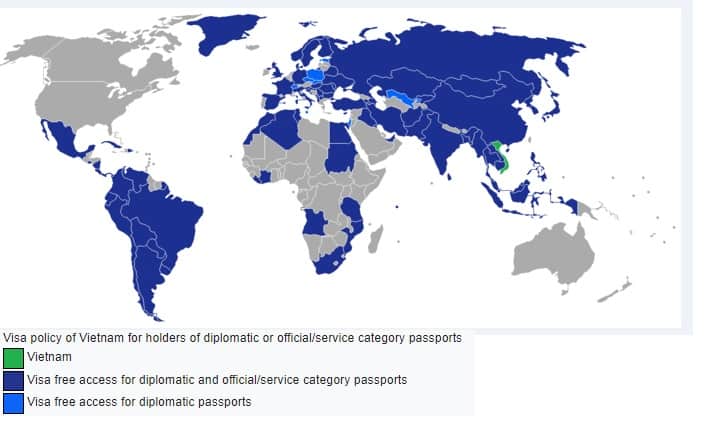
Map of Vietnam visa exemption policy for non-popular passport holders (Source: Wikipedia)
Visa exemption policy for those traveling to Phu Quoc Island
All travelers who directly visit Phu Quoc Island from a third country will be exempted from Vietnam visa requirements for up to 30 days. Travelers who are not exempted from visa requirements can visit Phu Quoc without a visa for up to 30 days.
V. How to get a visa for Vietnam
Those who are not eligible for visa exemption will need to get a visa to enter Vietnam. Getting a visa for Vietnam perhaps does not pose any problem or difficulty as at the moment, there are up to 3 ways to get a valid and legitimate Vietnamese visa, namely:
- Apply for visa at Vietnam embassy;
- Apply for Vietnam visa on arrival; and
- Apply for e-visa.
Now, let’s learn one by one briefly.
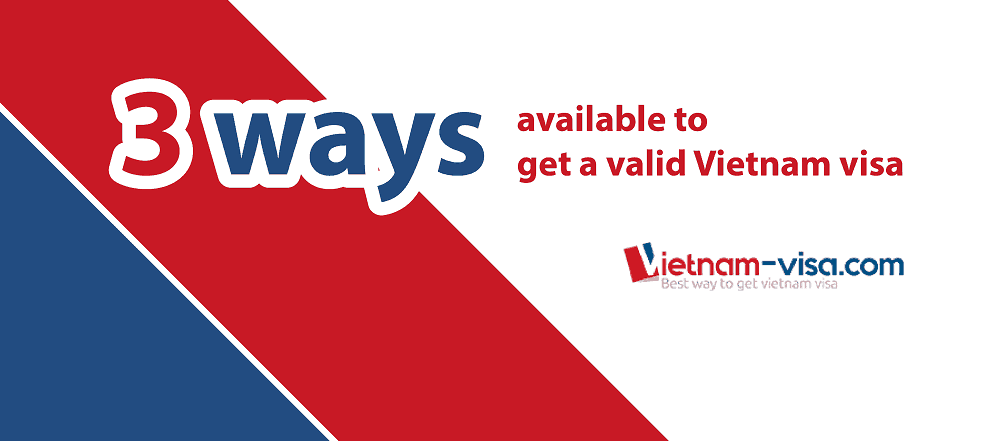
3 ways to get a legitimate visa for Vietnam
1. Vietnam embassy visa (also known as Pre-arranged Vietnam visa)
This is the traditional way to obtain a visa for Vietnam and is issued by Vietnam missions in foreign countries (Vietnam embassy/consulate).
To get this kind of visa, applicants will normally need to:
- Visit the website of the embassy/consulate with which they need to apply for the visa;
- Complete the form, stick your photo there and sign it;
- Travel to the embassy/consulate of Vietnam to submit the form together with the original passport and other documents (as required) and pay the visa fee;
- Travel back home and wait;
- Travel to the embassy/consulate again to receive the passport together with visa stamp.
This whole process may take 3 to 5 working days. And it is available for both tourists and business travelers to Vietnam with a validity of up to 1 year. Vietnam visa cost of this kind varies by visa type and embassy as well.
Here are the contact details of Vietnam embassy/consulate worldwide: Vietnam Embassy Directory.
2. Vietnam visa on arrival (VOA – also known as Vietnam visa at airport)
Issued by the Vietnam Immigration Department, this type of visa is the most commonly used way to get the visa today due to these 5 undeniable advantages of Vietnam visa on arrival.
To get a visa on arrival for Vietnam, the applicants only need to follow these 3 simple steps:
- Access to website of a Vietnam visa center, then complete an online form, and make payment of service fee to such center;
- After a certain period of time, normally 2 working days, they will receive a visa approval letter via email;
- They will show the letter to board the flight and then finally get visa stamped upon arrival at Vietnam airport by showing the original passport and the visa approval letter and paying stamping fee.
Important notes for Vietnam VOA:
- Same day/urgent processing is available;
- This kind of visa is available for both tourists and business travelers to Vietnam with a validity of up to 1 year.
- It is for those traveling to Vietnam by AIR only.
- To get a visa on arrival for Vietnam, you need to pay for two kinds of Vietnam visa on arrival fees: service fee and stamping fee.
3. Vietnam electronic visa (or E-visa)
As the newest way of getting a visa to Vietnam, e-visa has been introduced since February 1, 2017 in a 2-year pilot duration. It takes 3 working days for processing, costs US$25 and is granted for single entry visits for up to 30 days to nationals of the 46 eligible countries at the beginning. Up to now, this number has been increased to 80 since February 2019.
Visit this Vietnam e-visa guide to get full details about this type of visa for Vietnam, covering:
- Nationals eligible for Vietnam visa;
- Applicable ports of entry;
- How to get an e-visa for Vietnam;
- Vietnam e-visa fees;
- Important remarks for Vietnam e-visa.
This is a brief description of 3 ways to get a visa for Vietnam today. A full comparison which provides you with a basis to decide which one is the most suitable option for you is available here: 3 ways to get legitimate Vietnam visa.
Here comes the policy of Vietnam visa which is regularly updated upon any changes.



